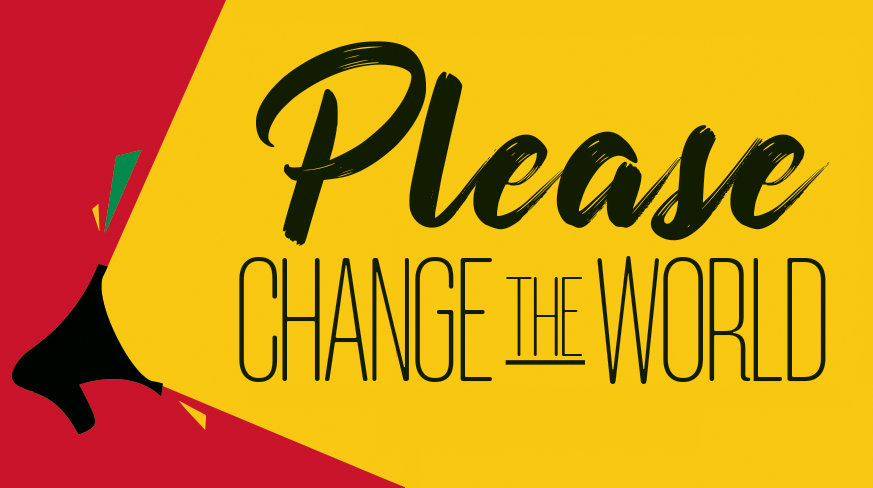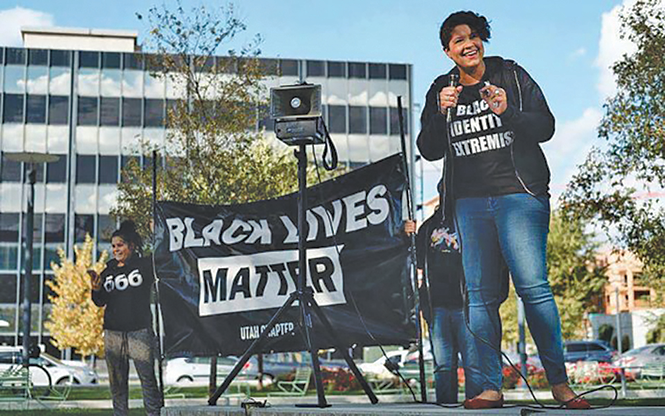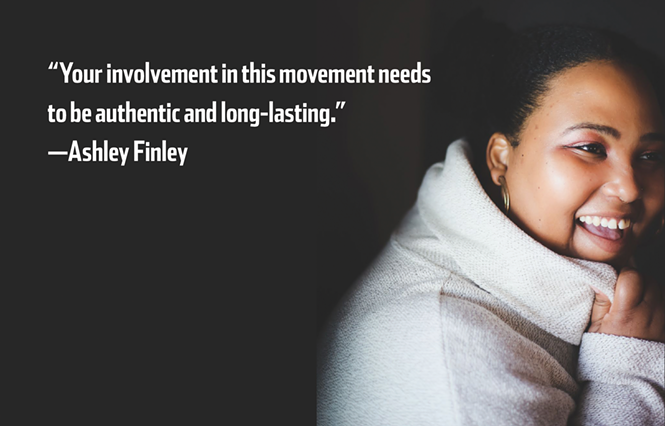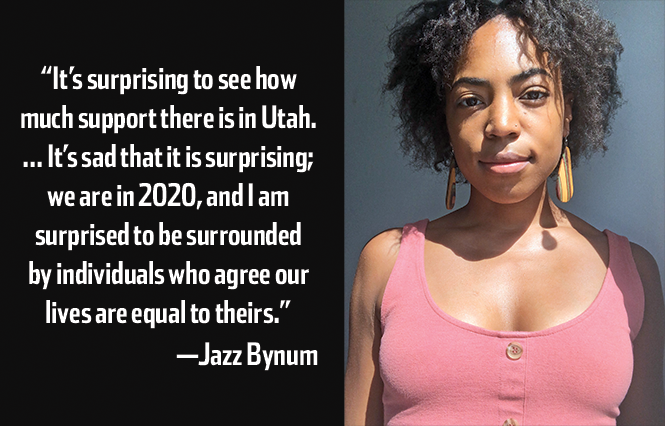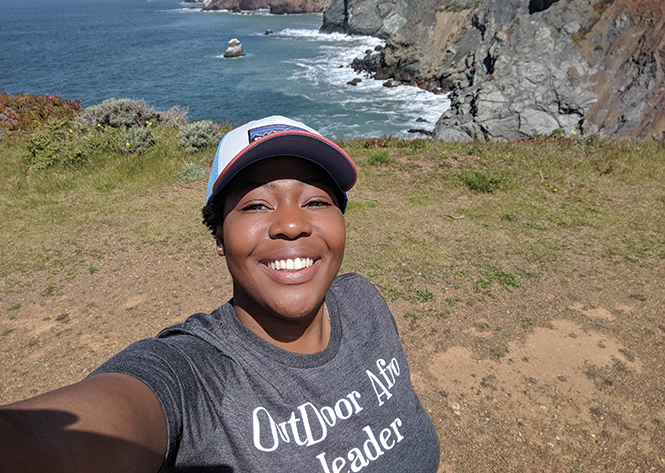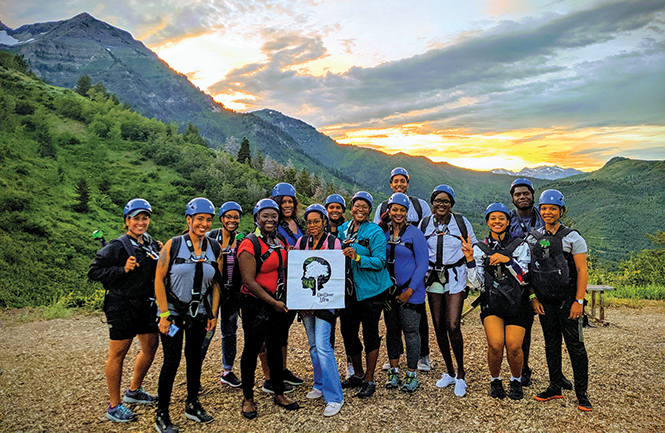Please Change the world
Those fighting for racial equality want you to stick around and make some noise. Week 2 of Black Voices Matter
Looking for a quick fix for centuries of oppression and racial injustice woven into the fabric of American life? It doesn't exist. That's because white people are the ones who have to change. They have to train their eyes to see bigotry and bias where it exists, which is just about everywhere, often hiding below the surface where it slowly festers and robs Black Americans of their hopes and dreams.
It took the heartless murder of George Floyd at the hands of the Minneapolis police for white America to wake up from its apathetic slumber. Yet, awake they now are. So, how can Black liberation leaders harness this national outrage to further the cause?
In Week 2 of our "Black Voices Matter" coverage, we bring you interviews with local activists who represent the lifeblood of the local movement, those who can bring about changes in the coming years where it is needed most: in law, government, education, urban planning, business, the arts and even outdoor recreation.
If you want to be inspired, read these interviews (as well as those from June 18) and join the fight for Black liberation.
—Jerre Wroble
Lex Scott
Black Lives Matter Utah
Day job: Director of recruitment for an engineering company
What does your organization do?
Black Lives Matter Utah is a civil rights organization that's Black led. Anyone can join, Black voices lead.
What are you experiencing these days?
Lately, things are totally insane. It feels like we have been ignored for six years and now the world is listening and taking action. I am very thankful for that. My voicemails and texts are full of congresspeople, mayors and legislators. Our chapter is flooded with thousands of requests to join. It is extremely difficult to keep up. There has also been turmoil in the movement. This month has been one of the most difficult, taxing and turbulent months of my entire life.
We would like people to focus on putting pressure on their local legislators. We want them to call, email and visit legislators if possible. We want them to push police reform, defunding the police and abolition of police.
On growing up in Salt Lake
I grew up in Salt Lake City and Denver, Colorado. I experienced a lot of racism in Utah. I was bullied. At that time, I was very shy and just wanted to fit in. I just wanted friends. Instead, I was met with pain and hatred. That's why we go so hard when we get a call about a bullied child in Utah. We want to stop that trauma and ensure this child does not have to go through those things. We want to send a message to Utah schools that the bullying of Black children will no longer be tolerated.
When I was growing up, I didn't know a lot of Black children. I was able to make and keep Black friends during the summers that I spent in Denver. In Utah, I got used to being the only Black child in class and sometimes in my entire school. I struggled with my identity. I'm half-Black and half-white and never felt accepted by either Black or white children.
I compared myself to Spock from Star Trek. I was told that I was ugly so much that I began to believe it. I then discovered Malcolm X who taught me that I am beautiful. The journey to love myself and to define my own blackness was a long journey. I now love myself and my blackness.
How did racism show up in your life?
I would be invited to attend events with white children, and I would look forward to going. When I arrived, they would bully me, make fun of my hair and my body. This was not a one-time thing. I kept hoping they would change. They did not. I was called a "nigger" repeatedly in high school and frisked outside of a grocery store when I was 10 years old. I was told, "Back of the bus, nigger" by a kid in the hallway and was also physically assaulted. A boy picked me up and threw me over his shoulders, carried me into the men's locker room, threw me on the ground and then turned on the showers. I've had too many racist experiences to explore here.
What must change to enable people of color to feel safe, valued and equal?
We must educate the people who affect the lives of Black people. People in all professions should undergo implicit bias and diversity training. We must pass legislation to ensure that Black people have equal pay as well as equal access to housing and education. We must eliminate student-loan debt and pass serious police reform. We need to defund the police; Black and brown communities must be allowed to police their own neighborhoods.
Police are not held accountable for their actions. So, while police exist, we need independent civilian review boards that have the power to investigate and bring charges against them.
On how to make the criminal justice system more humane
The criminal justice system is not only broken, it is a human-rights nightmare. We need to let out all nonviolent drug offenders. We need to build more rehab facilities so that jails and prisons are not used as drug treatment centers. We need more mental health courts and drug courts that will allow people with serious addictions to get help and not be criminalized for their addictions.
We need to stop criminalizing sex workers and change the laws that target them. We need to give mental health treatment to people who need it, and not attempt to arrest away the problem. For-profit prisons must go away. We also need to ban the box and not allow employers to discriminate against people who have been in jail and prison. We need more programs for people who have been released. It is a vicious cycle, and it must end.
What do you need us to hear?
That all people are capable of racially insensitive acts. Having a Black friend or relative does not excuse racism or make you incapable of committing a racist act. I need you to see color, and not erase it. Stop saying things like, "We are all one race, the human race"—that is racial erasure.
I need you to understand that different people have different experiences. Ignoring racism doesn't make it go away, it gives it an environment to flourish. If you had cancer, the doctor would not say, "Don't talk about it, and it will go away." We need to have these uncomfortable, hard conversations.
Police brutality exists and is real. The families of police brutality victims are real. The injustice that they have faced is real and horrifying. This country has been broken for a long time. It is time for real and lasting change.
How can people help?
I understand that everyone wants to hop on the bandwagon. Some people are "protest tourists." Others think the movement is trendy. Some are profiting off the movement and exploiting it. Please remember that after the crowds have gone, after the headlines have gone, police brutality victims still need and want justice.
We have to change the entire system. We can't lose this moment. Please do not look away. Please do not keep scrolling. Please make some noise, show up to the polls, call legislators, work the polls, educate yourselves about racism, apologize when you are racist and listen to Black voices.
Do not allow this moment to disappear without affecting real change. Please change the world.
A book Lex Scott recommends
The Autobiography of Malcolm X.
When there is dissension in the ranks
The hardest thing about civil rights is that we can't all be united. People need to understand that we can disagree and not have a beef. We do not have to start all-out wars with one another when we disagree. The hatred comes from all sides sometimes. We need to keep our eyes on the ball. We need to focus on creating change. We can have different ideologies, different tactics. But we need to not focus so much on hating and instead focus on self-love and building Black and brown people up. Unity is needed.
Ashley Finley
Independent organizer/activist advocating racial justice, decolonization, climate justice and reproductive justice
Your background
My professional experience ranges from work in the nonprofit sector, to genetics and to higher education. Currently, I am a self-employed doula, poet and educator. I also consult for organizations and businesses looking to become culturally competent and integrate an antiracist stance in their everyday dealings. People can find me on Instagram @findafinley or @sacredsisterdoula. My websites are findingfinley.com and sacredsisterdoula.com
What are you experiencing right now?
Since the murder of George Floyd, I've seen an influx of requests to help educate businesses and community members about what it means to be anti-racist. George Floyd's killing really shocked a lot of non-Black folks in an unprecedented way. They were forced to face the truth of what Black people in this country have been saying for years—for decades. People are now unable to deny that this is the reality of their Black neighbors, co-workers and family members, and they are upset. They're angry that this country pulled the wool over their eyes and made them believe that racism was a thing of the past. That accounts for an explosion in my inbox from non-Black community members asking for resources and how they can help the Black Lives Matter movement. They are starting to finally believe us.
On being a transplant in Salt Lake City
I grew up in Southern California and came to Salt Lake in 2012, after undergrad, because the recession was still happening, and I could not find a job.
When I first came here, I experienced a huge culture shock as Utah was and is less racially/ethnically diverse. I found it hard to find people that I could relate to from a cultural standpoint. I felt really alone at first. It is also much more politically and religiously conservative. In California, religion doesn't play such a large role in the passing of legislation. And generally speaking, it remains a blue state.
Also, winter is a thing I was not used to! In California, as kids, we went to the snow for a day trip! Then, when we got tired of the snow, we came back down the mountain to 70-degree weather. I was not used to cold weather that lasts for months. I've been here for so long now, and I am still not used to winter. Nor am I a fan.
How did you connect with your community here?
Through the slam poetry scene. I started going to open mics and poetry slams and felt really embraced. Then, I moved from Sugar House to the Rose Park area and started being introduced to organizing and activism circles. I started seeing more people that looked like me. I started finding people who could relate to me on a cultural level. A lot of us used the same kinds of hair products, ate the same things and valued the same ideals. We even looked up to the same authors, artists and organizers. That's really when Salt Lake started feeling like home. My village has only grown since them. I am so grateful.
How has exclusion /bias shown up in your life?
Systemic racism literally permeates my life. As a Black person, it is hard to pinpoint one specific example. From the time I was self-aware, I knew that I would have to fight for my life for the rest of my life because of racism. I grew up knowing that I had to do my best to play it safe when cops were around or in predominantly white spaces because it was incredibly feasible that I could end up dead, injured or in jail.
Her goals and beliefs
I seek the liberation of all Black Indigenous People of Color (BIPOC). I seek a return to the ancestral knowledge and organization of BIPOC that existed before colonization. I seek the physical, spiritual and mental healing of BIPOC.
What must change now to enable people of color to feel safe, valued and equal?
White people have got to start investing in becoming anti-racist in a sustained way that has longevity. This can't just be a trend. It can't just be a moment. This has to be a genuine investment that will last from now until true justice is achieved, and even after, to sustain that justice. There has to be real generational change. It took 400 years of white supremacy to get us here to this moment. White folks have to be willing to invest 400 more years to dismantle white supremacy.
On how to fix the criminal justice system
This criminal justice system is an inherently racist system that exists at the expense of Black and brown bodies. Nothing about it is humane. In order to heal this system, it must be dismantled and replaced with something that exists outside of white supremacy and colonization.
What do you need people to hear?
I just want people to understand that your involvement in this movement needs to be authentic and long-lasting. It is important, in this time, to listen to those who have been doing this work. Listen to those who have been here. Listen to BIPOC about their lived experiences. We are dying. We need people who really care about our lives in this fight.
How can people help?
People can compensate BIPOC activists and educators
Protesting
Civil engagement
Standing up against racist friends and family
Demanding that the local police get defunded
Educate yourself
EDUCATE YOURSELF ON RACISM with ashley Finley's picks
Films
Just Mercy
13th
Fruitvale Station
Do the Right Thing
I Am Not Your Negro
Whose Streets?
Rosewood
Queen & Slim
Let the Fire Burn
When They See Us
Books
The Hate U Give
How to Be an Anti-Racist
White Fragility
Why Are All the Black Kids Sitting
Together in the Cafeteria?
The New Jim Crow
Just Mercy
Between the World and Me
If Beale Street Could Talk
The Fire Next Time
Musicians
Noname
Rhapsody
Queen Latifah
Solange
J.Cole
Kendrick Lamaar
Immortal Technique
Nina Simone
Sam Cooke
Miles Davis
Yasiin Bey (Mos Def)
Lauryn Hill
The Fugees
Run the Jewels
Erykah Badu
Harry Belafonte
The Freedom Singers
Grace Jones
Jazz Bynum
Volunteer, protester
Ballet West II dancer
How she became active in the local movement
I'm an African American woman, here for the people.
I am from the East Coast and moved to Utah to pursue a career in ballet; I am currently dancing with Ballet West in the second company. My life has brought me to this movement; I have known this fight my entire life.
Aside from joining groups on social media and following activist groups and learning how to get involved, I urge people to listen and pay attention to their neighbors who they follow on social media and seek out their history.
People need to search for and read literature on the movement, which we had to do in order to "fill in the blanks" on our history that's not taught in the school systems. Just the other day, I learned about the 1898 Wilmington race riot in North Carolina. There are so many important stories of our history that the system and school systems try to hide from us. So, listen, seek to understand and learn how to take action.
What's changing out there?
The only thing I have been able to change in how I have always fought and advocated for myself is I have gotten louder—literally.
A lot of my activism shows through my encouragement of other Black and brown dancers trying to pursue a career in ballet. I share my experiences and encourage them not to let others discourage them. I remind them of our worth and power. I call others out for their inappropriate actions toward Black and brown people, and now I am beginning to speak at a greater capacity.
I want to inform individuals as to what they can do to make a difference and how to be a part of this 400-year-long movement. I want to let people know what they may be doing wrong and follow that with how to fix it while also spreading positivity and encouragement. I want to express that we need to move forward together—we have to fight together and that includes our police and elected officials.
We all live in the same communities and cities, and we need to begin working that way. There is more momentum in this movement because people are angry and done with having to constantly deal with the same injustices. We are exhausted and ready to make change, yet others are uncomfortable with the role they may have played in racism or participating in micro-aggressions, so people are speaking up and getting much louder.
It's surprising to see how much support there is in Utah. I didn't know there would be as many passionate individuals in support of us. It's sad that it is surprising; we are in 2020, and I am surprised to be surrounded by individuals who agree our lives are equal to theirs. People have fought together all over the world, and they are listening.
On growing up on the East Coast
I grew up in Maryland and up until moving here, I always had a diverse community, whether it was family or friends around me. Living here now is the first time I do not have that, and I mean more than just Black and white. It is a very odd situation to be in. The experience of culture is extremely different; there is no escape from the microaggression and, at times, racism. Trying to navigate that experience is hard especially when you don't know where it may come from next.
This isn't everyone, of course, but there have been enough instances that experiencing the June 4 march [where she was interviewed for KSL.com] was a big surprise to me.
How she found community in Utah
I always get to know my community by talking; I am a pretty social individual. Since living in Utah, my connections have been primarily through social media, which is where I have been doing most of my advocacy.
I had a feeling during the speeches prior to the march that brought me back to college. Being there and hearing many stories and speeches, there was no way I could remain silent. An invitation was given for any voice to come up and speak, and then another invitation to the megaphone. I love fighting for my people, and I will continue to do so.
We have to do it together
My biggest priority is getting us all, and I mean all of us, to exist equally. We have to work and function as a community. We can't attack each other anymore; we need to listen to one another and make decisions together. There are so many things that need to be changed and fixed, from police reform to how "we the people" exercise our rights and voice in the system, to making sure everyone in every community receives equal opportunity to succeed in life.
Far too many years have gone by where people believed their voices didn't matter or that they didn't have the capacity to make change, and that's simply not true. The system has to work for everyone but how can that happen if every voice isn't heard?
We need to sit down with police chiefs and elected officials at every level and change, edit and polish our system together. We cannot exist in this way anymore. I can't say what will take away the fear because we all have different emotions and experiences.
But these actions are a start. Everyone fighting now—and the changes that will be made—have to be consistent. None of this stops here. I believe we can get to a place where we can finally exhale and live, but we have to do it together.
On making the criminal justice system more humane
We need to sit down with the chief, officers and our elected officials in each county/state and comb through the police protocol. Take out the practices that are unnecessary and inhumane. We need to put together a system that works for all and make sure that no matter who is being apprehended, it is the same protocol every time. No more deaths of an unarmed, nonviolent man or woman. No more racial profiling. No race is better than another, no race is more dangerous than another. This new system has to be fair, and it has to make sense.
How can people help?
By being active. March in the street with us, engage in conversation, donate and spend money in Black-owned businesses, listen and speak up when you see something happening that isn't right. Don't laugh at someone even if it's uncomfortable—instead, speak up for them. Stand up for the movement whether or not your Black colleagues or friends are there.
The biggest part of this is integrity. Do the right thing because that is what you should do—not because eyes are on you.
The last thing I can say is to not tokenize Black, brown or any people of color. The whole point of our movement is that we are humans and our lives matter. We are not trophies or toys. We cannot be tried on, and we should not be treated like your favorite toy—sometimes, you love it and you can't put it down, and sometimes you want nothing to do with it. We are not going anywhere, and we will continue to shine, so why not exist with us?
Films Jazz Bynum recommends:
Selma
Marshall
12 Years A Slave
13th
When They See Us
Just Mercy
There are many to watch but these are examples of how the system has continued to fail us throughout our history. It shows the struggle to exist. It may not look the same, but the same struggle and fight are still here.
Good reads:
The New Jim Crow: Mass Incarceration in the Age of Color Blindness by Michelle Alexander"The Devastation of Black Wall Street" by Kimberly Fain in JSTOR Daily
Letter From the Birmingham Jail by Dr. Martin Luther King Jr.
Podcasts she likes:
1619 and The Breakdown
Ashley Cleveland
Volunteer for Outdoor Afro Salt Lake City, single mom and city planner
What does your organization do?
Outdoor Afro is a national nonprofit organization that is 10 years strong with more than 80 volunteer leaders across the U.S., and I am one of them.
It's my job to engage and lead our Salt Lake City network in outdoor experiences—whether it's a hike up to the Living Room or finding the only Black park ranger in Utah and camping with him at Zion National Park.
I encourage Black people to recreate together, share existing knowledge and foster new relationships with nature. It's where "Black people and nature meet." For more information and mission statement, visit outdoorafro.com and click on the map for Utah for detailed information.
How has the pandemic affected your outdoor activities?
To respect social distancing, we have been advised to follow the guidelines of our city and state or have groups no larger than 10, outdoors, and only with masks.
I'm also noticing momentum—maybe on the support side from people wanting to be allies. There is more engagement with existing members about sharing space and supporting community care of each other.
I think most people wanting to be allies have been wanting to be for a while and should've been. It just took some shock to get them there.
How public lands once served as her temporary home
I grew up moving around a lot, in and out of chronic homelessness. At times, national parks, BLM and Forest Service lands and state parks were temporary homes in between states. The longest I've ever lived anywhere was in Ventura County, California, in Oxnard (Anderson Paak is from there!). I moved to Salt Lake City for grad school at the U of U in 2014.
How does Utah compare to California?
Surprisingly, I know more Black Indigenous People of Color (BIPOC) folks here than I did in Ventura County.
California is a big state, and Southern California can be tricky for diversity. We share about the same access to outdoor recreation—just engage in different activities.
How did you find a community in Utah?
Through activism work. Then the Outdoor Afro SLC group just grew through word of mouth and Facebook. I wasn't expecting that! We have, like, 400 members now—all ages, orientations, nationalities, skill levels and abilities.
How systemic racism shows up in environmental planning
As a city planner, I think about the nexus of urbanism, environmental racism and access to the outdoors. All you have to do is look at the types of homes and institutions that are closest to trails, good parks, community gardens, ski lodges, rivers with adequate ramps, lakes, boat docks, safe pedestrian trails, train yards, industrial manufacturing, oil refineries and nature centers.
The proof is in the map. It's in the data. If you want to read some, follow me on Instagram @outdoorauntie. Or Google "desegregation of national parks" for a glimpse.
Black, indigenous and people of color are an afterthought when it comes to access to nature and environmental health and long-term planning. Until that changes, we will always have activists, a few allies who are learning as they go and our family members and children suffering the consequence and trying to clean it up.
How do we enable people of color to feel safe, valued and equal?
Existing representatives have to stop gatekeeping power. They need to use themselves as a bridge, not a telephone for underrepresented people to draft and decide on studies and bills.
A great start would be forming task forces to provide transit, childcare and a wage for people who are the overworked (I don't like to say "working poor of low income").
Also, stop dusting off the diverse leaders you already know. A lot of us are doing five things. Our pastors and existing legislators are already doing the work; there are new voices in the mix that have ready hands. Trust their leadership.
On making the criminal justice system more humane
If we can't abolish it, if it can't be reformed and not a free labor-based system like Angela Davis writes about in Are Prisons Obsolete?, then at bare minimum, decrease the amount of police by half, charge police officers for their conduct because Breonna Taylor's murderers are still free and, for goodness sakes, reallocate that funding to BIPOC social workers, birth workers, health institutions, grassroots organizers and nonprofits that serve us and to domestic violence institutions that want to help and not out us in the system.
What do you need people to hear?
While on a trail, I have had a white woman invade my personal space with her dogs muttering about my presence on "her" trail. I've been called out by name en route to nature spaces. Access due to proximity is not access if it's not attainable because of budget constraints, lack of knowledge or safety concerns. Tracy Aviary, the Millcreek REI and a few people at the GOED Outdoor Recreation office are those I trust.
How can people help?
Donate to Black outdoor organizations, encourage local outdoor orgs that have headquarters here to start partnership agreements. Donate to gear libraries, donate your gently used gear to a BIPOC friend before taking it to the thrift store. Do you have BIPOC friends? If you see us out and about, know that the outdoors is for everyone and mind the business that minds you. If you see us being reprimanded by staff or someone who isn't sharing space, film it or protect us. Don't let "Karening" get us killed.
On the need for safe spaces
We need safe places to grieve. For Black people and supporters of Black people connecting to nature, in July and August, we will be trying to find safe spaces in nature to grieve and receive grief counseling from Black counselors. Follow our national organization on Instagram @outdoorafro
Books she recommends
• The Bluest Eye by Toni Morrison
• Pushout: The Criminalization of Black Girls in Schools by Monique W. Morris
• Root Shock: How Tearing Up City Neighborhoods Hurts America, And What We Can Do About It by Mindy Thompson Fullilove, M.D.
• The Color of Law: A Forgotten History of How Our Government Segregated America by Richard Rothstein
• The Souls of Black Folk by W. E. B. Du Bois
Latest in Cover Story
Readers also liked…
-
Forget the family pedigree—Robert F. Kennedy Jr should not be the next president of the United States
Trojan Horse
- Jun 21, 2023
-
Women decry harassment and toxic culture at St. George auto dealership
Men at Work
- Oct 11, 2023


